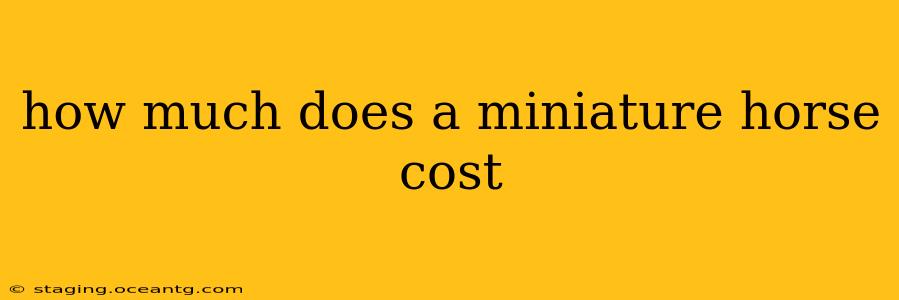The cost of a miniature horse varies significantly depending on several factors. It's not a simple case of a single price tag; you'll find a wide range, reflecting the animal's lineage, training, age, and overall quality. This guide breaks down the different cost factors and helps you understand what to expect when purchasing a miniature horse.
What Factors Influence the Price of a Miniature Horse?
Several key elements impact the final price you'll pay for a miniature horse:
1. Lineage and Bloodlines: Miniature horses with champion bloodlines and pedigrees boasting award-winning ancestors will command significantly higher prices. These horses are often considered superior breeding stock or show prospects. Think of it like buying a pedigree dog – the rarer and more established the lineage, the higher the cost.
2. Age and Training: A well-trained miniature horse, especially one trained for specific disciplines like driving or showing, will be more expensive. Younger, untrained horses are generally cheaper, but you'll need to factor in the costs of training yourself. The age also affects the price; weanlings (young horses that have been weaned from their mothers) cost less than older, mature horses.
3. Conformation and Health: The physical structure and overall health of the miniature horse dramatically influence its value. A horse with excellent conformation (its structure and how its parts fit together), good bone structure, and a clean bill of health from a veterinarian will be more expensive. A horse with health problems or poor conformation might be cheaper but could lead to higher veterinary bills in the long run.
4. Location and Seller: The geographic location and the seller's reputation can also affect pricing. Horses sold through reputable breeders or established farms might cost more, but this usually reflects a higher standard of care and breeding practices. Prices also fluctuate regionally.
How Much Can I Expect to Pay?
Given the variables above, a price range is more helpful than a single figure. Generally, you can expect to pay anywhere from $500 to $10,000 or more.
-
Lower end ($500 - $1,500): These horses might be younger, untrained, or have less desirable lineage. They may also need more veterinary attention.
-
Mid-range ($1,500 - $5,000): These horses usually have good conformation, are reasonably well-trained, and come from reputable breeders.
-
Higher end ($5,000 - $10,000+): These are exceptional miniature horses with champion bloodlines, superior conformation, extensive training, and proven show records.
What Additional Costs Should I Consider?
Beyond the initial purchase price, remember to factor in ongoing expenses:
- Veterinary care: Routine checkups, vaccinations, and potential treatments for illness or injury.
- Farrier: Regular hoof trimming or shoeing.
- Food and feed: High-quality hay, grain, and supplements.
- Housing and shelter: Stable, paddock, or other suitable shelter.
- Tack and equipment: If you plan to ride, drive, or show your miniature horse, you'll need specialized equipment.
What are the different types of miniature horses?
There isn't a strict breed classification for miniature horses; the term "miniature horse" is more of a size designation. However, some lines are more commonly associated with miniature horse breeding, often based on their heritage from larger breeds like American Miniature Horses and Fallabella horses. These lines may influence pricing due to established bloodlines and recognition within the miniature horse community.
What should I look for when buying a miniature horse?
Prioritize the horse's health and temperament. Get a thorough veterinary examination, check for any signs of lameness or other health issues, and interact with the horse to assess its personality and suitability for your needs and lifestyle.
Where can I find miniature horses for sale?
You can find miniature horses for sale through various avenues: online classifieds, breed-specific websites, and reputable breeders. Thoroughly research any seller before making a purchase.
By carefully considering these factors and conducting thorough research, you can make an informed decision about purchasing a miniature horse that fits your budget and expectations. Remember that owning a miniature horse is a long-term commitment, and responsible ownership requires careful planning and dedication.
